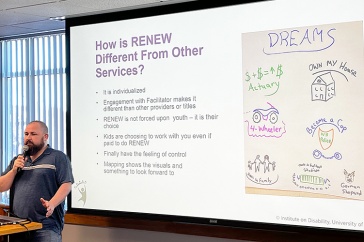
Students studying biotechnology at Great Bay Community College now have a convenient path to a four-year bachelor’s degree thanks to a new partnership between Great Bay and the University of New Hampshire at Manchester.
After completing a two-year associate degree at Great Bay, students can transfer to the four-year biotechnology program at UNH’s campus in Manchester to continue their education. The biotechnology industry supports more than 5,000 jobs in New Hampshire, and that number is growing. The U.S. Department of Labor predicts the industry will grow by about 10 percent over the next decade.
Great Bay Community College supports the industry by preparing students with a two-year associate degree. According to Deb Audino, biotechnology professor at Great Bay, after completing their education at the Community College, many students begin their careers in biotechnology at Lonza. Lonza is an international biologics manufacturing company which shares space on the Pease Tradeport with Great Bay.
Now students can take advantage of the biotechnology Public Pathways Program to continue their education and qualify for better-paying jobs in the industry in New Hampshire and elsewhere, said Kyle MacLea, assistant professor of biology at UNH Manchester.
“This eliminates the transfer headache by clearly outlining the courses needed to take in the first two years at Great Bay, so students will know exactly how they will transfer to UNH’s campus in Manchester,” MacLea said.
UNH Manchester began the biotechnology B.S. program in 2015. It was created to train more high-tech workers in the industry. Six students enrolled the first semester, and it grew to 17 by the second semester.
Two of those students, Rachel Main and Brittany Warren, transferred from Great Bay.
“The pathway between Great Bay and Manchester seems really simple and painless,” said Main, 22, who lives in Eliot, Maine. “There are not really any schools around that have a biotechnology bachelor’s program. When Manchester came up with it, it made sense. I have my associate. Let’s get my bachelor’s.”
According to Main, during her time at Great Bay, she was also involved in an undergraduate research project through the NH INBRE grant, furthering her interest in biomedical research. Her hope is to continue on with a similar project while at UNH.
“The goal is keep going with my education and get better at the skills I already have, and get ready for a future career,” Main said.
UNH Manchester’s program will prepare students for biotech industry jobs, and its rigorous curriculum also prepares students, like Warren, who are considering graduate or pre-health and medical programs after graduation.
Warren, 23, enrolled at Great Bay as a cost-effective way to get back into the education system, after almost two years out of school. She viewed her Great Bay experience as a stepping stone to something else, and the biotechnology program at UNH Manchester helps her reach that goal. She intends to pursue a master’s in public health epidemiology, and hopes to work at the Centers for Disease Control and, perhaps, volunteer for Doctors Without Borders.
Audino and MacLea both view Main and Warren as trailblazers – and the first of what they hope to be many students who will take advantage of the Biotechnology Public Pathways program .
Great Bay’s biotechnology program is highly regarded in the industry for producing well-trained graduates, said Audino. She said the pathway to UNH Manchester enhances Great Bay’s program and will make it more attractive to prospective students, she said.
“At Great Bay, we are getting more traditional high school students who want to get their bachelor’s degree," Audino said. "They see Great Bay as a very affordable way to start their college education, and then they can transfer to another program."
-
Written By:
Lisa Proulx | Great Bay Community College | lproulx@ccsnh.edu | 603-427-7641
















































